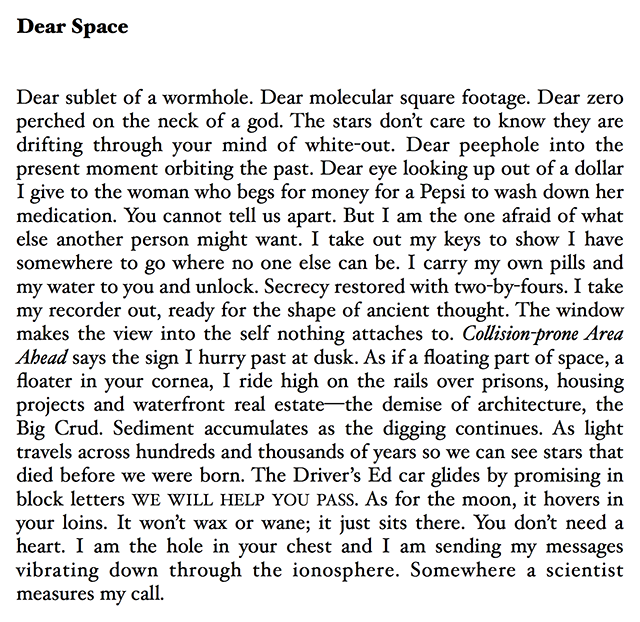John Carpenter, "Night"
There seems to be a little bit of legacy management — bigfooting? — going on with John Carpenter’s Lost Themes. It’s like Cliff Martinez got a little attention for his work with Steven Soderbergh and then old man Carpenter materialized out of the mist with an enormous synthesizer under his arm and bellowed, “NOT SO FAST.”
Product Announced
“The crowd went silent. The Samsung presenter removed an obsidian-dark rectangle from a velvety pouch. He flicked it with one finger, and an orange light in the middle blipped on and off. The audience went fucking crazy. As if to say But there’s more, the presenter held up his flicking finger, silencing the crowd again.
‘Tell me, can your rectangles do this?’ He flung the metallic board against the ground, where it shattered and dissolved into a fine powder. A man wearing a bright Wall Street Journal sash began to sob and applaud. Drones dropped confetti.”
New York City, January 8, 2015

★★★★ Spilled fluids — coffee, dog urine — lay in thick irregular blobs where they’d been captured and solidified in the middle of trying to spread out and flow. The coffee carts were battened down. The cleaners’ door was jammed, opening barely wide enough to squeeze through with a down coat and a full bag. The subway turnstile revolved stiffly; a chalky dryness covered the fingertips: The cold was inside things, causing pain and damage. Some of the snow had sublimated away, but there was still a thin virgin coat up the fire escape and on the roof. Not one person had wandered up that way in two days. The forgotten tub of beer up there was a shin-high chunk of ice, studded with immobile cans.
Relationship Consummated

“The image shows two colliding galaxies, collectively called Arp 299, located 134 million light-years away. Each of the galaxies has a supermassive black hole at its heart.”

“NuSTAR has revealed that the black hole located at the right of the pair is actively gorging on gas, while its partner is either dormant or hidden under gas and dust.”

“The new X-ray data from NuSTAR — overlaid on a visible-light image from NASA’s Hubble Space Telescope — show that the black hole on the right is, in fact, the hungry one.”
The Gator Lost His Mind: The Historical Ballads of Johnny Horton
by Casey N. Cep
I’ve been meaning to write about Johnny Horton. He sang some of the best ballads on country radio in the fifties. There was one called “Comanche” about a horse who happened to be one of only survivors from General Custer’s regiment at the Battle of the Little Bighorn. Another one, called “Sink the Bismarck,” was about the Nazi battleship that terrorized Allied ships until it was finally sunk by the British. I also really liked “North to Alaska,” about the gold rush. But the Johnny Horton saga song that my sisters and I could never stop signing was “Battle of New Orleans.” I don’t remember when my father first played it for us, but for years — well, for decades now — we’ve all three loved it.
“Hut-two,” one of us would whisper in the back seat of the Blazer or the front seat of my father’s Silverado, and the other two would shout back, “Three-four!” My poor mother knew exactly what this nonsense meant, and she’d look away or sometimes even crack a smile as the rest of us launched into the song. My father would take the lead, “Iiiiiiiiiiin 1814,” and then we were off to the races, or our own version of the races down the “mighty Mississipp” with Ol’ Hickory.
I made the mistake once of trying out this routine in a high-school class, but only one other person knew the wonders of Johnny Horton and the words to this song: our history teacher. He and I sang the whole thing, while those other philistines listened and laughed. You’d think that would have taught me about the refined tastes required for appreciating the masterworks of Johnny Horton, but it didn’t. A few years later, I tried to sing the song again in public, only this time I was living in England and I thought Horton’s patriotic ditty might make for a funny pub night. Unfortunately, “the bloody British” did not appreciate the ballad’s brilliance. But here I am again, trying to convince the world of the genius of Johnny Horton.
Today’s as good a day as any: January 8th, 1815 is when the battle of New Orleans ended. The war itself had technically ended in December of 1814, when a peace treaty was signed in Ghent, but word of that peace didn’t reach America for a few more weeks, so British and American troops continued fighting on the Gulf Coast well into February. The victory at New Orleans didn’t win the war, but it did win the peace, at least for Andrew Jackson, whose military triumphs would carry him to the White House thirteen years later. “The 8th of January” became as famous a date as the Fourth of July, inspiring cartoons and songs, including the fiddle tune that’s the spine of Johnny Horton’s ballad.
Horton didn’t write “Battle of New Orleans,” but he did take it to the top of the charts in 1959. It was an unlikely hit: it celebrated an American win, but a win almost a hundred and fifty years earlier. Imagine if a song about the Battle of Gettysburg suddenly topped the charts today. The song even won Johnny Horton a Grammy a year later, the height of a craze when Americans preferred their history in sing-songy, fear-defying, rally-crying ballads.
There’s some plucky banjo picking and drum beating at the song’s start, but lyrically it gets right down to business: “In 1814, we took a little trip, along with Colonel Jackson down the mighty Mississip.” Those bloody Brits arrive only a few seconds later: “We fired our guns and the British kept-a-comin’.” A minute later, and Horton is screeching about how those red coats kept “runnin’ on down the Mississippi to the Gulf of Mexico.”
The whites of their eyes order might have originated at Bunker Hill, but Horton has Old Hickory telling his troops they “could take ’em by surprise if we didn’t fire our muskets ’til we looked ’em in the eye.” The song’s a hoot, with men running through briars and brambles and bushes until the Americans melt the barrel of their cannon from overuse. Ever resourceful, they grab an alligator: “We filled his head with cannon balls and powdered his behind,” only “when we touched the powder off the gator lost his mind.” Cruelty in practice, but comedy in song: That poor gator lost his mind a few thousand times before my childhood self realized what damage such improvisation would cause if it were actually possible to turn an alligator into a cannon.
Anyhow, I loved this song as a kid. “Hup-one,” “hup-two,” I couldn’t stop singing it, and neither could my sisters. Hokey or not, we just loved it. I think we even wore out my father’s cassette tape listening to it so much. I’m sure he got sick of it, but he’s never once refused to sing along.
Country Time is an occasional column about country music.
Stairs
An old woman and her grandson are walking down the wooden steps leading from the deck of a beach house to the driveway. They’re holding hands but the old woman misses a step and tumbles forward and her hand slips out of the boy’s grasp. She does two somersaults and lands on the pavement and the boy hears her breath escape her and sees blood pooling by her head. It’s a darker color red, as it fills crevices in the black asphalt, than he’d seen blood before.
He turns and runs up the stairs and calls to his father through the sliding screen door.
“Dad, grandma fell down the stairs!”
The father leaps up from his chair and races to his mother. “Mom,” he says. “Don’t move.”
Her eyes are squinted shut but she nods.
An ambulance arrives soon and she is taken to the hospital. She will be fine. Six stitches, that’s all.
The father tells the boy, “You did the right the thing coming to get me so fast. You didn’t panic and that’s important.”
The boy is not so sure. He remembers his grandmother’s fingers, like plastic straws in their paper sheaths, and wonders, How did she not break?
(Previously.)
Johnny Jewel, "A Sort Of Homecoming"
Had enough words for the week? Me too. Look out the window and listen to this.
A Poem by Suzanne Wise
by Mark Bibbins, Editor

Suzanne Wise is the author of The Kingdom of the Subjunctive (Alice James Books) and a chapbook, Talking Cure (Red Glass Books). Recent poems have appeared in Bomb, Guernica, Ploughshares, Bone Bouquet, Catch Up, Green Mountains Review, and elsewhere.
You will find more poems here. You may contact the editor at poems@theawl.com.
